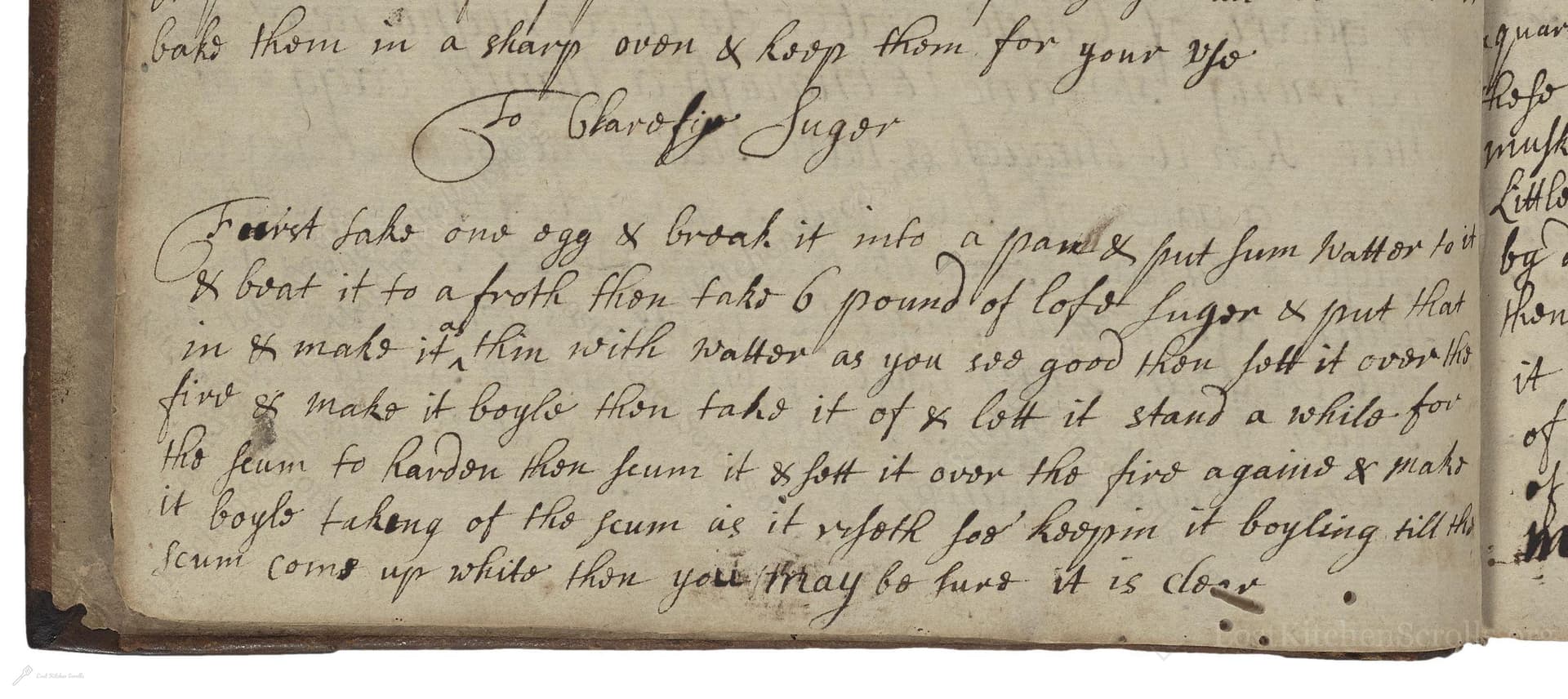To Clarofiy Suger
From the treasured pages of Mrs. Rachel Kirk Book 1707
Written by Rachel Kirk

To Clarofiy Suger
"First take one egg & beat it to a froth & put sum watter to it & beat it to a froth then take 6 pound of lofe suger & put that in & make it thin with watter as you see good then sett it over the fire & make it boyle then take it of & lett it stand a while for the scum to Raisen then scum it & sett it over the fire againe & make it boyle takeing of the scum as it ryseth for keepin it boyling till the scum comes up white then you may be sure it is clear"
Note on the Original Text
The recipe is written in a conversational, instructive style typical of home recipe books in the early 18th century. Spelling and grammar were far less standardized than today—'suger' for 'sugar,' 'watter' for 'water,' 'boyle' for 'boil,' and so forth. Directions rely on observation ('make it thin with watter as you see good') and personal judgment rather than precise measurements or times. This method encourages cooks to engage their senses and adjust according to what they observe, a hallmark of historical kitchen practice.

Title
Mrs. Rachel Kirk Book 1707 (1707)
You can also click the book image above to peruse the original tome
Writer
Rachel Kirk
Era
1707
Publisher
Unknown
Background
A remarkable collection of early 18th-century recipes, Rachel Kirk's work invites readers into the kitchens of the past where classic culinary traditions and timeless flavors come alive. Expect a charming medley of savory feasts and sweet treats reflective of the era's sophisticated palate.
Kindly made available by
Folger Shakespeare Library
This recipe comes from the household records of Rachel Kirk in 1707, a time when refined sugar was still a luxury in many households and came in large, cone-shaped loaves. Clarifying sugar was a crucial step for creating smooth preserves, syrups, and confections without cloudiness or impurities. The use of egg whites to 'clarify'—trap and lift away undesirable particles—was a well-established technique, demonstrating both resourcefulness and culinary knowledge. Such recipes offer a glimpse into the daily tasks and skills valued in early 18th-century kitchens.

In the early 1700s, this recipe would have been made over an open hearth or a wood-fired cookstove with a large copper or iron pot. The cook might have used a simple wooden spoon or whisk to beat the egg whites, and a large slotted spoon or shallow ladle to skim off the scum. No thermometers were available, so cooks judged readiness by visual cues such as the color and appearance of the foam.
Prep Time
10 mins
Cook Time
30 mins
Servings
15
We've done our best to adapt this historical recipe for modern kitchens, but some details may still need refinement. We warmly welcome feedback from fellow cooks and culinary historians — your insights support the entire community!
Ingredients
- 1 large egg white
- 3.4 fl oz water (for beating with egg white)
- 6 lb white granulated sugar (modern replacement for loaf sugar)
- 3.4 cups water (approximate, use as needed to thin syrup)
Instructions
- Begin by separating one egg (preferably a large egg) and beating the white until it forms a frothy foam.
- Add about 3.4 fl oz of water to the egg white and continue to beat until well-combined and foamy.
- In a large pot, place 6 lb of white granulated sugar (a modern substitute for loaf sugar) and add enough water, approximately 3.4 cups, to create a thin syrup—just enough so the sugar dissolves and has a watery consistency.
- Stir the egg white mixture into the sugar and water in the pot.
- Set the pot on the stove over medium heat and bring it to a boil.
- As the mixture boils, remove it from the heat occasionally to allow the impurities (scum) to rise to the top.
- Skim off this foam carefully.
- Return to the heat and continue to simmer and skim until the remaining scum on the surface appears white and clean, indicating your syrup is well-clarified.
- Use this clarified syrup as a fine base for preserves, confections, or desserts.
Estimated Calories
350 per serving
Cooking Estimates
You should plan about 10 minutes to prepare your ingredients, including separating and beating the egg white. Cooking and clarifying the syrup usually takes around 30 minutes. This recipe makes about 15 servings, with each serving containing roughly 350 calories.
As noted above, we have made our best effort to translate and adapt this historical recipe for modern kitchens, taking into account ingredients nowadays, cooking techniques, measurements, and so on. However, historical recipes often contain assumptions that require interpretation.
We'd love for anyone to help improve these adaptations. Community contributions are highly welcome. If you have suggestions, corrections, or cooking tips based on your experience with this recipe, please share them below.
Join the Discussion
Rate This Recipe
Dietary Preference
Main Ingredients
Culinary Technique
Occasions

Den Bockfisch In Einer Fleisch Suppen Zu Kochen
This recipe hails from a German manuscript cookbook compiled in 1696, a time whe...

Die Grieß Nudlen Zumachen
This recipe comes from a rather mysterious manuscript cookbook, penned anonymous...

Ein Boudain
This recipe comes from an anonymous German-language manuscript cookbook from 169...

Ein Gesaltzen Citroni
This recipe, dating from 1696, comes from an extensive anonymous German cookbook...
Browse our complete collection of time-honored recipes



